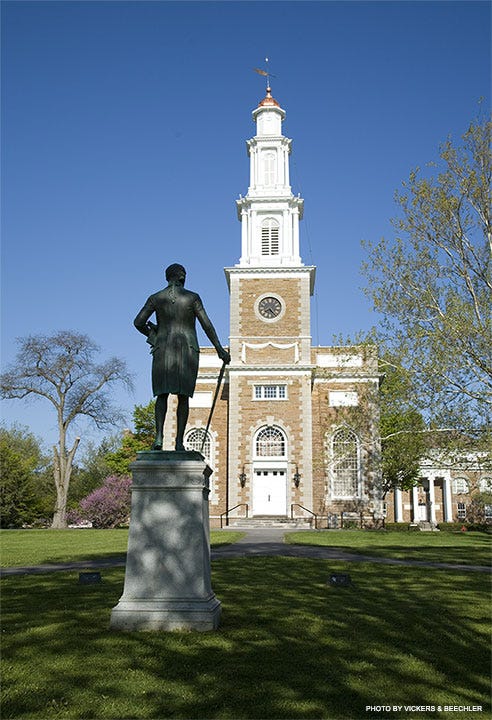
Courtesy of Wikimedia Commons
Thursday, May 2 marked the annual International Holocaust Remembrance Day. Hamilton College Hillel, Chabad of Clinton, and the Hamilton College Chaplaincy came together to host a vigil and memorial outside the Chapel at 4:00 PM in memory of those lives lost in the Holocaust. The event featured a candle lighting ceremony and several speeches by students and faculty. Students also signed pledges to do good deeds, or “mitzvah,” as a means of continuing to heal the world.
The vigil came in the wake of the Poway Chabad Synagogue shooting on Apr. 27, which left one Jewish congregant dead and an entire community scarred. This attack follows a more general trend in recent years of increasing numbers of anti-Semitism and anti-semitic hate crimes across the world.
According to the FBI, there were 938 hate crimes committed against Jewish people in the United States in 2017. This is up about 37 percent from 2016, when there were 684 such hate crimes. Additionally, they reported that hate crimes against Jews make up a majority (58 percent) of hate crimes against religious groups. These numbers are expected to rise in 2018 and include the October shooting at the Tree of Life Synagogue in Pittsburgh, which resulted in the deaths of 11 Jewish congregants, including a 95-year-old Holocaust survivor. The shooter allegedly yelled “all Jews must die” as he carried out the attack.
Among the population at large, Holocaust remembrance events are a means of education. One survey released on Holocaust Remembrance Day in 2018 showed that 31 percent of Americans and 41 percent of millennials believe that less than 2 million Jews were murdered in the Holocaust. In reality, over 6 million Jews were murdered in the Holocaust in over 40,000 different ghettos and death camps; out of the 40,000, however, 45 percent of Americans can’t name even one camp or ghetto. Still, 93 percent of respondents said that the Holocaust should be taught about in school and 80 percent said it’s important to learn about in order to prevent a similar event from happening again.
For speakers at the vigil, the recent attacks made it clear why Holocaust remembrance is especially important in the modern day. College Chaplain Jeff McCarn, Hillel Advisor and Jewish Chaplain Anat Guez, and Co-Director of Chabad of Clinton Didy Waks spoke about the importance of remembering and teaching about the Holocaust. Some of the speakers talked about rising global anti-Semitism and all spoke within the context of the recent shooting in Poway.
After the vigil, Waks said “the purpose [of the vigil] is to honor the victims by lighting candles […] to mourn the millions who literally have no descendants too […] observe the memorial for them.” He hoped that the vigil would be a way to show that “we are learning the lessons” of the Holocaust to “make sure” it never happens again.
Ben Keller ’21, co-president of Hamilton College Chabad, was one of several Jewish students who spoke at the event. They shared stories of Holocaust survival how the Holocaust still affects many Jews today.
Afterwards, Keller said: “When it comes to violence against a certain group because of their race or ethnicity, it’s important that everyone look at and remember the atrocities of the past to make sure they don’t happen again.”
Sammy Wolfe ’21, co-president of Hamilton College Chabad with Keller, spoke about the comfort of having a Jewish community on campus. Wolfe entered the school as a January admit and said having an established community of support has shaped her experience at Hamilton. On the vigil, she said it was “amazing that I have a community that I can lean on and have support through on such a difficult day.”
An email was sent to the Hamilton community by Hillel on Apr. 12 which urged the campus to attend the vigil and to join the groups in creating a communal art project inspired by The Daffodil Project.
The project was started by the non profit Holocaust Education and Awareness Organization Am Yisrael Chai; its goal in developing The Daffodil Project was to plant 1.5 million daffodils around the world in memory of the 1.5 million children who perished in the Holocaust. They also stand in support for children suffering in humanitarian crises in the world today.
Am Yisrael Chai believes the daffodil is the perfect shape for the effort since the shape and color of the flower represents the yellow stars that Jewish people were forced to wear during the Holocaust.
Hamilton College Hillel had a large daffodil poster representing the organization stationed in Kirner Johnson before and after the event. They encouraged everyone to participate by adding a word to the poster that they associate with the tragedy of the Holocaust or with its remembrance.
